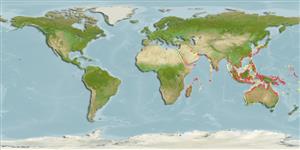Environment: milieu / climate zone / depth range / distribution range
Ecology
Marine; brackish; demersal; amphidromous (Ref. 51243). Tropical
Indo-West Pacific: ranges from Pakistan to Japan and Australia. Known from the freshwater tidal zone of the Mekong (Ref. 12693).
Size / Weight / Age
Maturity: Lm ? range ? - ? cm
Max length : 14.0 cm SL male/unsexed; (Ref. 12693)
Distinguished by the following characteristics: prominent barbel on ventral midline near
symphysis of lower jaw; upper jaw teeth 19-31; head depth 10.1-12.4% SL ; caudal fin length 18.5-25.1 % SL ; length of D 1 base 5.7-7.5% SL; 4-7 vertical, narrow, bluish grey bars on trunk; no large, black spots or stripes basally on posterior half of D2; D2 and anal fins connected by membrane to caudal fin (Ref. 5218).
Facultative air-breathing (Ref. 126274); An intertidal species (Ref. 31184) found on sand and mud flats along bay shores. Also in estuarine areas, swamps, marshy areas and on tidal mud flats (Ref. 5258). Also found in the freshwater tidal zone (Ref. 12693). Actively shuttling back and forth between rock pools and air (Ref. 31184). Feeds on algae and harpacticoids, chromodorids and nematodes (Ref. 92840). Amphibious air-breather (Ref. 31184).
Life cycle and mating behavior
Maturity | Reproduction | Spawning | Eggs | Fecundity | Larvae
Murdy, E.O., 1989. A taxonomic revision and cladistic analysis of the oxudercine gobies (Gobiidae: Oxudercinae). Rec. Aust. Mus., Suppl. 11:1-93. (Ref. 5218)
IUCN Red List Status (Ref. 130435: Version 2024-1)
Threat to humans
Harmless
Human uses
Fisheries: minor commercial
Tools
Special reports
Download XML
Internet sources
Estimates based on models
Preferred temperature (Ref.
123201): 24.6 - 29.2, mean 28.5 °C (based on 2978 cells).
Phylogenetic diversity index (Ref.
82804): PD
50 = 0.5625 [Uniqueness, from 0.5 = low to 2.0 = high].
Bayesian length-weight: a=0.00490 (0.00286 - 0.00838), b=2.83 (2.68 - 2.98), in cm total length, based on LWR estimates for this species & (Sub)family-body (Ref.
93245).
Trophic level (Ref.
69278): 3.3 ±0.4 se; based on size and trophs of closest relatives
Resilience (Ref.
120179): High, minimum population doubling time less than 15 months (Preliminary K or Fecundity.).
Fishing Vulnerability (Ref.
59153): Low vulnerability (10 of 100).
